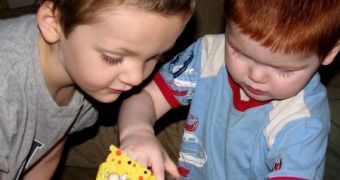A new research evidences the fact that the stereotypes usually associated with the behavior of older siblings are true. The work shows that the eldest brother or sister in a family tends to be less cooperative, trusting, and reciprocating than other siblings. The foundations for this line of investigations, into the behavior that first-born children exhibited, were laid back in the days when Sigmund Freud was conducting his revolutionary work in the field of psychology, ScienceNow reports.
One of the conclusions drawn over the years is the fact that middle-born children tend to be the ones that make most friends, and are the most social to other people. This happens because, involuntarily or not, parents pay most attention to the first and last born, and, therefore, the child in the middle needs to look for company outside the family. Psychology experts base their studies on this issue on questionnaires they apply to themselves, as well as on interviews they conduct with friends and family.
In the case of older siblings, researchers say, it may be that family dynamics play the most important part. When a second child is born, the first automatically receives less attention than he or she was accustomed to up to that point. As such, the children most likely feel the instinctual need to be more aggressive and competitive, while at the same time cooperating less, both with their parents and younger siblings. This is further evidenced by the fact that an only child behaves very much like a middle and last-born, having benefited from the parents' full attention all their life.
“That suggests that what influences cooperative behavior isn't being born first […] but instead a child changes his behavior when another sibling arrives,” scientists at the University of Montpellier 2, in France, say. Details of their latest work appear in the December issue of the respected scientific journal Animal Behavior.
“All the strength and maturity is in [firstborns'] hands for a number of years. So they don't have to go out of their way to bargain or tradeoff with other siblings,” University of British Columbia personality researcher Del Paulhus adds. “Cooperation [as a strategy] often entails risks, because cooperation isn't always reciprocated,” University of California in Berkeley evolutionary psychologist Frank Sulloway concludes.

 14 DAY TRIAL //
14 DAY TRIAL //